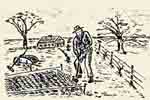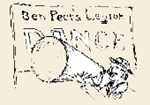

 |
 |
| Home | Index | Museums | Blog | Authors | Site Map | About |
|
January, February, March 1903 and 1953Glancing BackwardbyBeth FloryNews items from the Naples Record 100 years and 50 years agoJanuary 1903By now winter was well established. The ice harvest had begun and the ice houses were filling up. The Record reminded readers to "blanket your horses. Do not let them stand out in the cold without being covered." With the popularity of sleighing, many horses led active lives. A rough road caused Guy Fulkerson's cutter to tip over and break apart. His horse took off dragging the cross bar and thills (shafts). The unfortunate driver was left behind with the rest of the wreckage. Despite drifted roads, rural mail carriers managed to stay on schedule and continued to be rewarded with bags of oats from grateful folks along the routes. In addition to oats, Charles Flint received an invitation to dinner and a silver dollar from William Frink. J. E. Loveland put his mill up for sale. It included "good twenty-horse steam power with first class woodworking machinery." The Farmers Institute, held in Bristol Springs, was both instructive and entertaining. The horse expert was "bombarded with questions." Insect pests and other topics were discussed and an orchestra was on hand for the social hour. The Springs correspondent also reported the birth of the eleventh child of Mr. and Mrs. H. Briglin. The writer approved, calling the Briglins "more than an average smart and pretty family." The Record editor was fed up with delinquent subscribers, some of whom he had carried for years. A mailing was planned to convey his exasperation and he need for money to meet expenses.
January 1953
January 1953 was fickle and unpredictable. In one 24-hour period, the temperature ranged from above 60 degrees to zero. The deer harvest had hit an all time statewide record with 42,080 taken during the fall season. Cattaraugus and Allegheny Counties, followed by the Adirondack and Catskill areas, were most productive. 911 deer were killed in Ontario County. President Elect Eisenhower's victory gave the stock market a huge boost, reported the noted analyst Roger Babson who was quoted in The Record. However he was not complacent: "Have these Republicans bought for investment or to sell again at a profit? my guess is the latter. The stock market can tumble from present prices as far as it can climb The sad truth is that the present period of prosperity has not been built upon honest work and savings. It has been built on borrowed money, much of which has been spent on useless war."
February 1903
At one point during this month of extreme weather (which included a severe rainstorm) the pipes in the Record office froze and burst. In spite of snow and cold, evening surprise parties were very popular. Friends sometimes traveled many miles by sleigh, bearing food and drink. At Seymour Edson's party, "there seemed to be no end of cakes and other good things, from the ordinary baked beans to the aristocratic Saratoga chips." It was morning before the crowd dispersed. Farmers were getting ready for spring. E. F. Andrews of South Bristol received two pairs of angora goats and hoped that their fine coats would prove profitable. Purl Yaw was drawing hop poles to Bristol. Eighteen lambs arrived at H. E. Seman's farm and all lived. The month ended on a hopeful note: "Robins and bluebirds have made their appearance in this village." February 1953
The Conservation Department was looking for trappers to camp in remote parts of the Adirondacks for a month during the open season for trapping beaver which was to begin on March 30. Beaver in these areas were so numerous that there would be no bag limit. In 32 western New York counties (including Ontario and Yates) the limit would be six. Many of us remember Bert Brand who died this month. For fifteen years he owned the grocery store at the junction of Routes 21 and 64 called "The Parting of the Ways." The delicious Herkimer County Cheese which he sold lives on in memory. He was a farmer, a constable for South Bristol and a busy auctioneer. Mary Griesa, another well known resident, also passed away. Born at Stempel's landing, she was survived by her sister Julia and brother George of steamboat fame. March 1903
March was its usual unpredictable self with temperatures ranging from 75 degrees down to freezing. Sap was running and bluebirds and robins were back but so was mud. Mailmen on their rural routes sometimes didn't reach home until dark. Up in Ingleside a petition was in circulation to "appeal for extra help to fix an impassible sink-hole in front of the residence of W. D. Blodgett." Just when farmers needed supplies and the roads were so bad, the Onnalinda and the Ogarita were in drydock for repairs so lake transport would be delayed. Fishermen were out, however, and there were plenty of whitefish and suckers to be caught. Twenty-nine friends gathered to help William Cornish of South Bristol who was recovering from a long illness: they pruned his vines and cleaned up his vineyard. And when veteran G. W. Strong lost his only cow, "he being worthy and unable to purchase another, his neighbors kindly donated a sum sufficient to help purchase another and assist him out of his misfortunes." Mr. Strong's son, Clinton, home on leave, was preparing to return to the Philippines with his regiment in April. A "trimming bee" was held by friends who came to work with Casper Schultz in his vineyard. Present were Jacob and Carl Wohlschlegel, George Klug, Andrew and William Scholtz, Willam Abel, Ernest Fribolin, Fred Shank, Frank Evarts, Fred Walter, Chauncey Dunton and John Rose. "A merry time was had as they worked, visited and sang. At the close of the day they repaired to the house where a bountiful supper was served, after which the evening was spent in visiting, music, games, etc. All declared they were ready for another trimming bee." The Record had "live correspondents" reporting in weekly from most of the surrounding settlements, from Vine Valley to Gulick. One place was "Pansy" and 100 years later inquiries failed to find anyone who remembered where it was. Now the mystery has been solved: "Hunts Hollow," the name the early settlers gave to our pleasant valley, has returned to it again, and we think to stay. The name "Pansy" died out and few there are to mourn the loss of the name." (Incidentally, it was always "Hunts" with an "s.") We close with two items of a medical nature: "The X-rays has (sic) been applied on Mrs. Chester Presler's throat, and whatever the trouble is or where it is was not determined." Then there was the unusual affliction of Mrs. Maud Gibson who "has been treated for blood poison in her face. She was poisoned by a primrose." March 1953Naples' own Frank Reddout, a six-foot-five-inch senior at Syracuse University, made basketball history there following "a brilliant record-tying 40-point performance against Canisius." He was fast and agile and especially good at free throws. As a result of his prowess, he was chosen to participate in the Herald Tribune's all-star game to be played in New York's Madison Square Garden. Meanwhile Herkimer, New York, and Springfield, Mass., each argued that it had been the site of the first basketball game and therefore was entitled to be the location of the proposed Hall of Fame. Servicemen always enjoyed and appreciated receiving The Record. Roy Rohlin sent thanks from basic training at Aberdeen, Maryland and Llewellyn Spangler described his pleasant tour of duty on board a ship making a good-will tour in the Caribbean. Lieut. Robert F. Dean was back on duty as executive officer of his field artillery battery on the Korean combat line after a week's rest and relaxation in Japan. Barbara Kayser enlisted in the Navy and reported for junior officer classes at Great Lakes. This month the deaths of several Neopolitans were recorded. Philip Gropenbecker had been an employee of Widmer Wine Cellars for 42 years. Mrs. Josephine Capron was a well known local historian and had taught in Canandaigua and Naples. NCS students were awaiting the arrival of George Eiferman who was to demonstrate his physical prowess at an assembly. He was the world champion weight lifter who claimed that he had entered the Navy at145 pounds and emerged several years later weighing 200. Readers of The Record were assured that the atom bomb test in Nevada indicated that automobiles withstood the blast if their windows were open and that bomb cellars provided valuable protection.
Index of articles by Beth FloryCLR Blog | Site Map | Contact CLR |